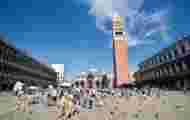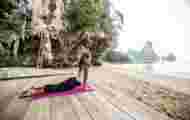Forget guided tours of historical monuments, tastings of local gastronomic specialties or even walks in breathtaking natural spots: the latest trend in tourism is “sleep tourism” in English. – if we are to believe the articles that have been springing up lately in the international press.
⋙ Quiche Lorraine, moussaka, goulash… What is the carbon impact of these European specialties?
What is sleep tourism?
As its name suggests, sleep tourism is simply traveling to places that promote a higher quality of sleep than you can experience at home. Today, “travellers book hotels to sleep”, affirms with our colleagues from CNN Travel Dr. Rebecca Robbins, author of the book “Sleep for Success: Everything You Need to Know About Sleep But Are Too Tired to Ask”.
⋙ Spiritual retreat: 10 destinations to recharge your batteries around the world
According to her, the hotel industry has particularly focused on what can interfere with sleep when traveling, such as “decadent meals, which shift the time of bed” but also holiday programs which can be at the expense of good sleep.
A trend that has increased in recent years, as the need for quality sleep has only increased during the Covid-19 pandemic. A study published in the “Journal of Clinical Sleep Medicine” revealed that 40% of the more than 2,500 adults who took part reported a reduction in the quality of their sleep since the start of the pandemic. “Sleep has been the subject of increased attention in the era of Covid-19, probably because many people have had difficulty sleeping during this period”, abounds the specialist.
⋙ World Sleep Day: our wellness destinations in France to rest
Hotels equipped to improve the sleep of their customers
Thus, a few months ago, the Park Hyatt hotel in New York, very close to Central Park, pulled out all the stops so that the hosts could sleep soundly. Some suites, for example, have been equipped with a connected bed that analyzes sleep, and whose firmness and temperature of one side or the entire mattress are fully customizable. This special sleep suite is described by the hotel group as “the perfect blend of comfort and functionality, designed to provide a restful night’s sleep”.
⋙ 10 must-see places in New York
Elsewhere in the world, hotels such as the Bryte Restorative Sleep Suite, in Londonor the Hästens Sleep Spa in Coimbra, Portugaloffer rooms where everything has been thought out to promote sleep – soundproofing of the rooms, hypnotherapy, meditation or even a session with a holistic sleep-focused coach.
⋙ 12 words that reflect the history of Portugal
Sleep tourism, reserved for an elite?
Nevertheless, this new sector of tourism is not aimed at all budgets: it is clear that establishments that rely on the sleep of their customers are relatively high-end. For example, you will have to pay more than 2,000 dollars a night (on average) to be able to enjoy the green view of Central Park from the 83 square meter “Sleep Suite” of the Park Hyatt in New York.
⋙ Palace and 5-star hotel: what are the differences?
The services offered around sleep go particularly far, as evidenced by the “Sleep Concierge” service, which could be translated as “Sleep Concierge”, offered since the beginning of 2021 to customers of the Belmond Cadogan Hotel, at the heart of the British capital.
Imagined with the hypnotherapist and holistic coach Malminder Gill, this service offered to clients with sleep problems includes, among other things, a recorded meditation, supposed to promote sleep, pillows that adapt depending on whether the client prefers to sleep on their back or on the side, or even a weighted blanket. A bedtime sipping tea has also been tailor-made to contribute to quality sleep, as well as a soothing pillow mist.
Is sleep tourism effective in the long term?
Can so many elements offer long-term benefits in terms of sleep? For Dr. Robbins, this sleep tourism can be extremely beneficial, but only if clients are offered real tools to help them improve their sleep over time.
A comfy bed, soft music and a cup of tea can’t, she says, solve deep sleep concerns on their own. This is why the specialist recommends that hotels call on experts, who will be able to dig into the causes of customers’ sleep problems.
Read also:
We would love to give thanks to the writer of this post for this amazing material
Sleep tourism: how to explain the rise of this new travel trend?
Check out our social media profiles as well as the other related pageshttps://nimblespirit.com/related-pages/



